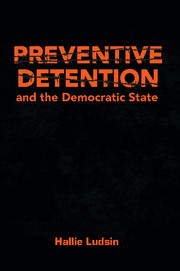Book contents
- Frontmatter
- Contents
- Acknowledgements
- List of Acronyms and Abbreviations
- Introduction
- 1 The Theoretical Framework
- 2 The Policy Debates
- 3 Preventive Detention under International Law
- 4 The History of Preventive Detention in India
- 5 India's Current Preventive Detention Legislation
- 6 India: Preventive Detention and Due Process
- 7 India: The Risk Society and the Slippery Slope
- 8 Preventive Detention in England
- 9 England: Preventive Detention and Due Process
- 10 Preventive Detention in the United States
- 11 The United States: Preventive Detention and Procedural Due Process
- 12 Preventive Detention's Slippery Slope
- 13 Preventive Detention and Liberal Democracy
- Index
1 - The Theoretical Framework
Published online by Cambridge University Press: 05 March 2016
- Frontmatter
- Contents
- Acknowledgements
- List of Acronyms and Abbreviations
- Introduction
- 1 The Theoretical Framework
- 2 The Policy Debates
- 3 Preventive Detention under International Law
- 4 The History of Preventive Detention in India
- 5 India's Current Preventive Detention Legislation
- 6 India: Preventive Detention and Due Process
- 7 India: The Risk Society and the Slippery Slope
- 8 Preventive Detention in England
- 9 England: Preventive Detention and Due Process
- 10 Preventive Detention in the United States
- 11 The United States: Preventive Detention and Procedural Due Process
- 12 Preventive Detention's Slippery Slope
- 13 Preventive Detention and Liberal Democracy
- Index
Summary
Chapter 1 explains why the climate is right for liberal democratic societies to slide down a slippery slope that allows fear of preventable crime to eclipse long standing democratic principles and transform preventive detention into an ordinary law enforcement tool. As this chapter details, the rule of law and due process rights were designed to prevent governments from inappropriately interfering with people's liberty. Liberal democracies have always rigidly applied these limits to protect against the rise of authoritarianism. They permitted incarceration only after conviction through a fair trial to keep governments from using detention to silence opposition or to bully their populations. They allowed preventive detention only in two extraordinary circumstances: (1) during a state of emergency, when the harm is considered too grave to be risked and the criminal justice system too overwhelmed to respond effectively, and (2) for the mentally ill and dangerous whom the criminal justice system can neither deter nor convict. They employed a cost-benefit analysis that concluded it was better to allow dangerous persons to go free and risk future harm than to incarcerate the innocent.
As democratic societies have grown more risk averse, they have located new exceptional circumstances that allow them to resort to preventive detention even when the criminal justice system can take action. The detention of suspected terrorists in Guantanamo Bay is perhaps the most notorious example of the expansion of preventive detention to a group that in the past would have been dealt with under criminal law. Other examples include the preventive detention of sex offenders in the United States and Australia and the detention of violent repeat offenders in many parts of Europe, including England, Germany, Austria, Belgium, Denmark, France, Italy, the Netherlands, Slovakia and Switzerland. These countries justify detention on the basis of preventing some anticipated future harm rather than as punishment for past behaviour. They have wiped away concerns about the possibility of erroneous detention by altering the cost-benefit analysis so that it is now better to detain a few innocent people to insure no dangerous person is set free. The expansion of preventive detention to new “exceptional” circumstances places many liberal democratic societies onto a slippery slope that leads to detention as an ordinary law enforcement tool and to an alternative, inferior legal system for detainees now identified as deviant others.
- Type
- Chapter
- Information
- Preventive Detention and the Democratic State , pp. 11 - 32Publisher: Cambridge University PressPrint publication year: 2016

